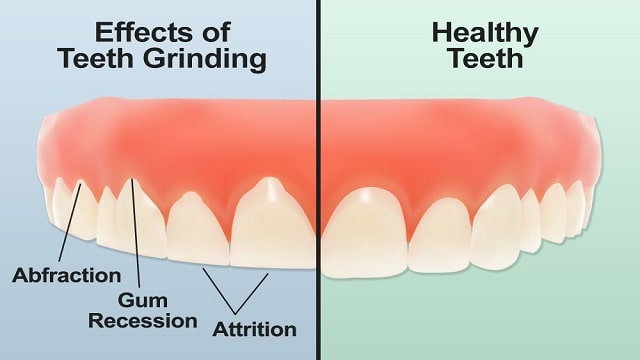What is Bruxism?
Bruxism is a parafunctional habit of grinding teeth or clenching the upper and lower jaws. This condition usually occurs unconsciously while sleeping or not.
Although it sounds trivial, this habit can cause several oral and dental health problems, such as jaw pain, tooth decay, and headaches.
Therefore, it is important to be aware of the dangers of this habit if it is allowed to continue in order to avoid unwanted negative impacts.
Symptoms of Bruxism
Bruxism can be known as the habit of grinding teeth every day. However, if the habit of bruxism occurs more at night, there are several things that you can be aware of as symptoms of this condition.
Usually, bruxism sufferers will feel tired in the morning because they have sleep disorders. In addition, in the morning they will feel a sore face and headaches.
Another sign can be seen in the shape of the teeth. Bruxism sufferers will experience cracked, broken, or loose teeth more often.
In addition, teeth will become more sensitive and jaw muscles will often become tired or locked.
Well, here are some symptoms of bruxism sufferers:
- Grinding or clenching teeth.
- Teeth that are flat, cracked, chipped, or loose.
- The appearance of pain and teeth become sensitive.
- Tired or tense jaw muscles, or a locked jaw that won’t open or close fully.
- Pain or soreness in the jaw, neck, or face.
- Pain that feels like an earache, even though it is not actually a problem with the ear.
- Headache.
- Having trouble sleeping.
Causes of Bruxism
Until now, the exact cause of bruxism is unknown. However, it is thought that there is a combination of physical, psychological, and genetic disorders.
Some possible causes of bruxism are:
Dentition
Young children are at risk of experiencing bruxism, even 40 percent of them experience bruxism.
This condition occurs when their teeth are growing.
However, the rapid growth of teeth and jaws in children means that bruxism can heal on its own without causing serious damage to the mouth and teeth.
Uneven teeth
In some people, bruxism occurs due to uneven teeth, causing chewing or biting activities to be inappropriate, resulting in bruxism.
Stress
One of the main causes of bruxism in adults that occurs during sleep or when awake is stress.
In fact, in 2020 there was a study that proved that there is a relationship between bruxism and stress.
Consuming alcohol, cigarettes, and caffeine
People who smoke or drink alcohol regularly are about twice as likely to experience bruxism, while those who drink more than 8 cups of coffee per day are 1.5 times more likely to experience bruxism.
This is proven by findings in 2016 which proved that the use of these three things was related to bruxism.
Bruxism Risk Factors
Bruxism disorders that occur when the sufferer is awake (awake and conscious) are usually caused by several factors, such as:
- Stress.
- Depression.
- Anxiety disorders.
- Feeling angry.
- Tension about a condition.
Bruxism that occurs when the sufferer is asleep is usually caused by a history of sleep disorders. The following sleep disorders trigger this condition:
- Obstructive sleep apnea.
- Sleep paralysis.
Bruxism Diagnosis
A doctor can diagnose bruxism through self–reporting by the sufferer and clinical observation of tooth wear.
If your doctor suspects that you have bruxism, he or she will also ask about your dental health history, from medication use, and activity habits, to a history of sleep disorders.
To confirm bruxism, there are several examinations that the doctor can perform:
- The examination includes the jaw muscles.
- Make sure you don’t have any dental abnormalities.
- Other damage to the mouth and teeth area. This condition will be examined using an X-ray.
Bruxism Treatment
In mild cases of bruxism, you do not need to undergo special treatment.
However, if this disease has caused other health problems or behavior, then there are several treatments that doctors can do:
- Fixing the condition of your teeth. If you have bruxism and your teeth are causing other symptoms, you may need to have your teeth fixed to reduce the risk of worsening symptoms. This treatment cannot stop bruxism, but it can prevent tooth decay.
- Use of mouth guards. Mouth and teeth guards can be used to separate teeth from damage caused by bruxism.
- Manage stress well. Stress and depression conditions that you do not handle well trigger this condition.
Complications of Bruxism
The habit of unconsciously grinding and clenching teeth can cause various complications that affect dental and oral health.
Apart from direct damage to the teeth, bruxism can also cause other, more serious problems.
Some complications that can arise due to bruxism include:
- Tooth and gum damage.
- Headache.
- Pain in the face and jaw area.
- Sleep disorders.
Bruxism Prevention
Efforts you can make to prevent this include managing stress, having a healthy sleep pattern, and visiting the dentist regularly.
In addition, bruxism sufferers can also reduce or prevent this habit by doing several things, such as:
- Avoid alcohol, tobacco or cigarettes, and caffeine.
- Managing stress levels.
- Avoid chewing gum as it can encourage the urge to grind your teeth more.
These various methods can be used to help reduce the habit of teeth grinding.
However, if these methods still do not work, you can contact or consult a doctor to get medical treatment or advice.

